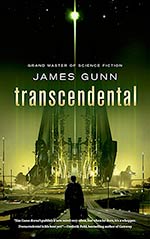
![]() illegible_scribble
illegible_scribble
1/19/2017
![]()
Galaxy-spanning, epic space opera with strong character development -- and a good mystery
One of my favorite types of stories is the galaxy-spanning, epic space opera with strong character development -- and a good mystery pretty much seals the deal for me. So the synopsis for Transcendental pretty much had me at "Hello".
The book opens in a dingy spaceport on a remote, forsaken planet a thousand years from now. Humanity, when it finally developed the technology to travel to the stars, discovered that the space beyond their solar system was already amply populated with numerous alien races who had forged a peaceful Galactic Federation -- with little room for human expansion. The appearance of violent, territorial, and acquisitive humans was perceived as a threat to the rest of the galaxy, and a bitter war was fought which finally ended in an uneasy truce, with humans joining the Federation.
All races have both societal and personal "pedias", devices with encyclopedic knowledge to which they refer constantly. The high-level societal pedias have taken over most of the basic manual labor tasks, as well as all of the intensive calculations required to run technological devices. Personal pedias provide a constant source of up-to-date information which assists individuals in decision-making. Beings from all races have come to depend on these artificial intelligences, and do not question or doubt the competency or benign intent of their AIs.
Riley, a special-ops soldier during the war, is now at loose ends; he no longer has the excitement-and-danger-driven purpose that he craves. He, along with numerous other aliens, is here in the spaceport to board a ship which is to set out on a pilgrimage. Rumors have been flying around the galaxy about a Transcendental Machine -- a technology by an ancient race purported to transform beings who enter it into vastly-enhanced, elevated, and powerful versions of their previous selves. It sounds ridiculous -- but the stories swirling around the Federation of a "Prophet", someone who actually went through the transcendence process, are so convincing that many people have decided it's worth risking everything to find out whether the stories are true.
But Riley has a secret: he's been provided with an augmented personal pedia with special powers to read information about the people around him, and paid an exorbitant amount by a mysterious employer to serve as a spy on the pilgrimage ship -- to determine which of the other passengers is the Prophet, to kill them, and to destroy the Transcendental Machine. Such a device, if it exists, would enable the race possessing it to enhance their abilities and tip the balance of galactic power in their favour. So each race has a strong motivation to attempt to gain the device for themselves -- or if that proves impossible, to destroy it so that no other race gains the advantage.
Once aboard the ship, the passengers discover that they are entrusting their lives to a poorly-maintained, unreliable ex-warship -- with a crew that seems strangely even less capable than the pilgrims. And it becomes clear that Riley is not the only one on the ship who is hiding a secret, and that there may be several different outside agencies attempting to control or destroy the ship.
Spaced throughout the action in both books are Canterbury Tales-ian interludes in which various human and alien characters talk about their lives, their species, and the history of their race in terms of the Galactic Federation. Action junkies may find these interludes disruptive to the flow and pacing of the story; however, I found them quite interesting and engrossing. The author has put a lot of thought and imagination into the worldbuilding -- not just of the alien races, but also of what might have been the human history of the next thousand years.
The science underlying both the basic and the more fantastical concepts in the book seems fairly solid to me. A professional physicist, engineer or astroscientist might find flaws in the scientific worldbuilding -- but I found it realistic enough that I was able to suspend disbelief and just roll with the story.